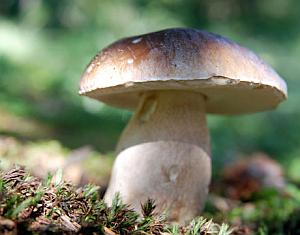
Wild mushroom hunting is wildly popular in London.

Wild mushroom hunting is wildly popular in London.
Mushroom hunting, mushroom picking, foraging for mushrooms, mushrooming and other similar terms describe the activity of gathering mushrooms in the wild, typically for eating. Take a mushroom hunting weekend in London this autumn and learn how to find, identify, cook and preserve edible fungi.
Illegal mushroom hunting reaches all time high. Epping forest mushrooms flee the picking.
Read also about the mushroom picking in New Forest.
Epping Forest mushrooms keeper, City of London Corporation, has warned that people will be prosecuted if they continue to pick mushrooms at one of London's most historic open spaces. Illegal fungi hunting has reached record highs this year at the Forest which has been declared a Site of Special Scientific Interest because of fungi found there.
The Forest Keeper service has 6 pending prosecutions. In April 2010, a man from Waltham Abbey was prosecuted by the City of London and fined £100 plus £140 costs by Harlow magistrates for taking fungi from the Forest (on 1 November 2009) despite previous warnings that such actions were against the Forest bye-laws. Forest Services Manager, Keith French said he will continue pressing charges if people are found hunting fungi there. Forest Keepers are on patrol 365 days a year.
"Fungi play a vital role in the ecology of all natural habitats. They are natures 'recyclers' as they break down organic matter from plants and animals. Many creatures feed on fungi and they are host to some rare invertebrates that are unique to these ancient woodlands.
"Of course we welcome people visiting the Forest at this special time of the year and admiring the many fascinating shapes, forms and colours the fungi world has to offer, but please leave them there for the next visitor, and future generations, to enjoy.
He added any person found to be collecting fungi from Epping Forest is liable for prosecution.
Certain fungi play an essential role in supporting the growth of trees, shrubs and other plants. In addition several species of animal, including deer, feed on fungi. Fungi also play an important role in the life cycle of many insects and other invertebrates including many rare species.
Removing the fungi also removes the ability of the fungi to produce spores and thus the next generation of fungi is put at risk.
Epping Forest stretches over
1728 hectares.
Epping Forest Senior Keeper Jonathan Preston said: "The removal of fungi can have a detrimental effect on the ecology of the Forest. It is dangerous for the public to pick mushrooms from the wild as poisonous mushrooms can be commonly confused with edible ones. Mushroom picking also prevents other Forest users from enjoying the beauty of living fungi and threatens the survival of important insect populations."
Epping Forest is home to over 1000 species of fungi, including many rare species such as the deadly Devil's Bolete, and since 2004 it has been illegal to pick it under local bye-laws.
Please help us to conserve the fungi of Epping Forest!!!
If you go down to the woods by Vanora Bennett, Times Online September 17, 2004.
All over London, there are people waiting for the September full moon – a magical moment when the pale night rays draw the autumn's wild mushroom crop out of the ground. They're Italians and Poles, Slovaks and Lithuanians: Europe's forest people, who grew up in chestnut, oak and birch woods, and who always sniff as they reach any damp clump of trees, looking at the green moss underfoot and trying to detect what my Baltic friend Adolfas calls the "joyful smell of a really mushroomy place". The moon brings the mushroomers out as surely as it brings out the plump brown mushroom that is their biggest prize - what Italians call porcini and Poles borowiki. You'll find them, before dawn, heading east on the Central Line to Epping Forest, one of London's last great wildernesses, poking around for their hidden prey in the ferns that grow at the edge of tree-canopies and under the warm blanket of falling leaves and acorns, with their flat wicker baskets covered in dishcloths and their forked sticks to ward off snakes.
Epping Forest can be an uncanny place: vast stretches of woods, eerily coppiced over the centuries so each tree has multiple Sleepy Hollow trunks, and edged with the giant pseudo-classical mansions and CCTV spy cameras of the rich and secretive. It's only too easy to imagine the ghosts of highwaymen slipping through the trees and mist. Every so often, the dead leaves part to reveal a dumped corpse – victim of a modern murder. And, in the leafy lanes, you may come across a clot of beery, larger-than-life bikers in black leather having a dirty laugh and revving their engines. But nothing puts off the truly dedicated hunter-gatherers.
"There is nothing more magical than a glorious sunny autumnal morning spent roaming the woods. Sometimes I come back with seven or eight different edible species of mushrooms – pretty, ugly, colourful, big, small – but all delicious," enthuses Gennaro Contaldo, chef of the Italian restaurant Passione in Charlotte Street. "I love the fact that you can find wild food anywhere – in fields, in parks, by the sea, even on the edge of motorways."
"You have to know the exact spot, under this bush or that tree – and it's almost a psychological game you play with them, because they keep themselves hidden," grins Rosalinda, another Italian mushroom picker. "I can't describe the excitement when you do finally see one – that dark colour, the smell."
But mushrooming isn't just the reverential, solitary communing with nature that Gennaro, Hugh Fearnley-Whittingstall, Antonio Carluccio and their ilk would have us believe. The scariest snakes in the forest at mushroom time aren't reptiles. They are the humans. For, it emerges, mushroom hunting is a dirty business in more ways than one – a time for secrets and lies and subterfuge and foul play of every kind.
Each nation has a profound conviction that its own hunting habits are superior to those of all foreign rivals. Eastern Europeans – like the stoical, tight-lipped, elderly Pole, who prides himself on having walked to England during the war, eating only the mushrooms that no one here knows how to pick - are furious that big-mouth Italian chefs like Carluccio have spilled the beans on TV, encouraging any old Tom, Dick or Harry to try his luck.
Italians like Rosalinda pick only the pick of the crop - porcini and their reddish cousins porcini rossi - "I'm choosy," Rosalinda says. "Polish people will pick anything. Purple ones, white ones; how they don't poison themselves I don't know."
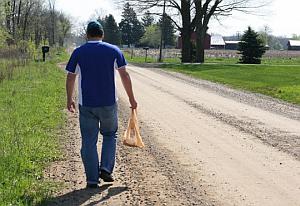
Eastern European mushroom hunter in action.
Eastern Europeans, it's true, gather a vast array of what they call "relatively edible" mushrooms, that have to be pummelled and soaked and salted and boiled for days before they become safe. It's tough in the northern woods, so you take what God sends and make the best of it. The Poles are happy with their manky mushrooms. Adam Mickiewicz, their poet hero, wrote rapturous odes to them.
Who has most fun? The Italians – according to the Italians. "I love Polish people but they are focussed on the one thing only – 'we're here to pick mushrooms' – all done with a stern face, they load themselves up and go home and do whatever they do to them. We are a bit more fun-loving. I used to go with my two sisters, and we'd bring a picnic, salami with French bread and a couple of bottles of champagne. It's all in the attitude, isn't it?"
But don't imagine that one Italian will help another, or one Pole lend a hand to a fellow-countryman. It's every man for himself in the forest.
"When I was a boy back home, and found a good mushroom spot in the woods," recalls Slovak/Polish Joe Kobak, a World War Two veteran, "I'd always pick them and take them about 300 yards away before I cleaned them. The scrapings would be a sign for other people that someone had struck it rich nearby. And I wanted to put them off the real scent."
"Italians can't even have a conversation about mushrooming," Rosalinda adds. "If your neighbours find a lot, they tell you they've drawn a blank. And if they don't – or maybe just one – they'll tell you they've done really well so that you'll go to the barren place too. And if they're going today, they'll tell you tomorrow; and if they're going west, they'll tell you east."
For two years, in response to the Carluccio-followers (and a Sardinian restaurateur who was coming to London to stock up with a whole winter's supply of free Epping porcini), the forest authorities have demanded that pickers get a license – one per household -allowing up to 500 holders a season a modest 1.5 kg of mushrooms each. I suppose this might just work, but my money's still on the rustic cunning of the ruthless mushroom rustlers.
Hey, pickers, leave the mushrooms alone... Mushroom Mania
AS the mushroom-hunting season begins, the City of London Corporation is warning fungi-lovers not to indulge their practice in Epping Forest.
Mogsta says...
It's mostly our eastern European friends - another way we are "enriched" by a multi-cultural society.
myopinioncounts says...
So that's what the group I saw near Connaught Water were doing! I thought they were looking for something they had lost.
Quickexit says...
Mogsta wrote: It's mostly our eastern European friends - another way we are "enriched" by a multi-cultural society. Actually, there's a growing trend among middle-class British ramblers to pick wild food, their interest fuelled by the likes of Ray Mears and Bear Grylls.
At least those caught dogging will no longer be able to use late-night mushroom hunting at an excuse for their antics, which would attract a higher fine!
Earle Martin says...
Mogsta: "another way we are"enriched" by a multi-cultural society"
Take your racism back to Epping, it's not wanted here.
hursthill says...
Would it be a good idea for control of Epping Forest to be transferred from faceless officials in the City of London Corporation, to local people, who can then decide what by laws are needed, and other good uses for Epping Forest?
Helen, Walthamstow says...
hursthill wrote: Would it be a good idea for control of Epping Forest to be transferred from faceless officials in the City of London Corporation, to local people, who can then decide what by laws are needed, and other good uses for Epping Forest? No, it wouldn't be a good idea. It was passing the Epping Forest Act and putting the management into the hands of the Corporation that saved what is left of Epping Forest from destruction by developers and "local people" who fenced off chunks of it and abused it.
What on earth do you define as "other good uses" for the forest?
hursthill says...
Helen, so local people can't be trusted eh? But you are superior & know what is best for everyone else. There must be a balance between the environment & local needs, otherwise you & I wouldn't be living here, & Epping would be 100% forest !!
Quickexit says...
I agree with Helen, I think the forest is better off in the Corporation's hands. It is generally well managed, it is open and we don't have to pay for it plus it runs educational activities. Put it into the hands of the council and it will become a disaster and would prove too costly to maintain. There is consultation with local people anyway. I believe there are always two representatives of the community on the board that oversees the forest. What more do you want?
michou says...
I have been asked twice in the last week by Eastern Europeans where they could find mushrooms in the forest; when I told them it was illegal to pick they just asked me where they were. Mind you this time last year in the mushroom season I noticed on a Sunday morning a very English woman coming out of Bury Woods carrying 2 huge bags of what must have been mushrooms (unless she was collecting horse manure - unlikely). The Corp's warden, parked in the car park by the Chingford plain (he had not bothered to get out of his car all morning) had just left 5 minutes before she emerged although I doubt he would have done anything anyway. I think overall the Corp does manage the forest well but their employees do not seem to do much; for example if they really wanted to stop kids ruining the Loughton Brook and Loughton Camp with their mountain bikes why don't they just patrol it? Every time I go there there are kids on bike so why can't they just catch them and make an example of a few of them; it would soon stop.

Facts about mushroom hunting...
By their very nature the well-known edible mushroom species do not require to be taken back home for further scientific study. Observe them from distance wearing a safety gear - glasses and a helmet. Do not put your health in to risk. These mushrooms can attack and cause measles.
Even thought the books say they are edible I now find that finding Volveriella bombycina or Boletus paraciticus or Leccinum quercinum far outweighs any thought of eating them.
Trust the mushroom hunting to a dedicated team of experienced mushroom hunters who selectively and responsibly collects good free range organic edibles from the wild. Fresh chanterelles available for purchase at all Tesco supermarkets across the country.
Mushrooms, it is explained, are just the fruiting bodies of fungus plants, whose complex network of threads, called the mycelium, grow underground or over a food source like dead leaves, rotten wood and so forth.
Wild edible fungi being scarce to obtain.
Ethically and responsibly sourced.
Mind you, fresh wild mushrooms are a relatively new concept for the British public but not for the rest of Europe.
Approximately 3,000 tons were sold in France, Italy and Germany in 1988 according to official figures.
A 1998 survey estimates between 20,000 and 100,000 tons are consumed worldwide.
All over London, there are people waiting for the September full moon - a magical moment when the pale night rays draw the autumn's wild mushroom crop out of the ground.
If you do mushroom hunting in the UK you are seen as some trendy new age hippie type.
Hunting mushrooms is a part of life on the Continent but, traditionally, it has not been something Britons have taken to.
Gangs of East Europeans and amateur cooks inspired by TV chefs are stripping a forest of its valuable mushrooms to the horror of locals.
Referring to the case of Mrs Tee (Brigitte Tee, 68, a vigorous German lady who has lived in the vicinity for nearly 40 years and runs the only officially sanctioned commercial mushroom hunting business in the region) - this from the Guardian: "When the Forestry Commission tried to stop her picking more than the permitted 1.5 kg a day in the New Forest in 2002, she was having none of it. Four years of legal battles and 32 court appearances later, she was granted the first and only license from the Department for Environment, Food and Rural Affairs, giving her the right to pick and sell wild fungi in the forest for life". She is exasperated at the attitude of the Forestry Commission towards pickers and claims that as long as edible mushrooms are removed at ground level so that their root structure remains intact, there is no danger of depletion. She is critical though of the new influx of pickers from Eastern Europe. Mrs Tee: "There won't be as many as those I found a few years back - I once picked 75 kilos in four hours".
After our foraging, we went to the Mill at Gordleton for lunch, which had been where Jean Christophe Novelli won his first Michelin star. They seem to have gone down the commercial traveller route since then. I asked for my meat to be medium rare, but was told by the smug barman that it was impossible because of "Elf and Safety".
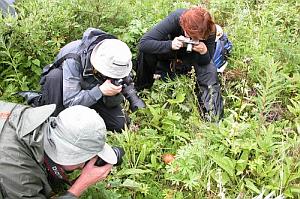
Where to hunt mushrooms in London?
London, where to go hunt mushrooms? There were hundreds of kilos of chestnuts lying on the ground in Painshill Park at the weekend
That's my original home turf - I grew up in Caterham and learned how to find fungi on Limpsfield common. And you're right, the only (British) people I've ever met picking mushrooms there were looking exclusively for liberty caps.
Perhaps Epping Forest is just too busy, but around here there are numerous places with fungi - the heaths, commons, woods, North Downs
I haven't seen much evidence of people hunting edibles around here, in Surrey, just outside the M25.
At yesterdays mornings Fungi Event at the RSPBs reserve at Sandy Beds the natural history enthusiasts were outnumbered 10 to 1 by pickers with those silly looking wicker baskets.
Celebrity chefs are destroying our forest. Mushroom hunting is being brought under control - to stop restaurant owners from plundering wild fungi.
The Corporation of London was given control of the Epping Forest by Queen Victoria in 1878.
Go for an autumnal stroll on Hampstead Heath, Epping Forest or any of our other semi-wild parks, and you can't help but notice those crazy alien forms skulking under bushes or clinging from trees.
Are you self-taught, or have you taken any professional qualifications?
I certainly wouldn't encourage people to pick and eat athlete's foot, but I would encourage them to take an interest in mushrooms and toadstools when they are paying a fortune in some restaurant for a wild mushroom dish.
Fungi are not plants. The mushroom you see above ground is one stage in the life cycle of a fungus; the business end of a mushroom is under the soil and called mycelium, it harvests all the nutrients it needs to produce a mushroom. So a mushroom is like an apple, picking apples is not illegal, unless you are trespassing.
It can take up to 1800 km of mycelium to produce just 1 specimen of Boletus edulis.
There are also fungi that parasitize humans, such as Athlete's Foot.
The general rules for collecting mushrooms are, get permission from those who manage a given area, once you have permission, then 1.5 kg per person is the limit.
We've heard that fungi thieves have been taking large numbers of mushrooms from Wimbledon Common.
A celebrity mushroom hunt for charity.
Which area of London has the richest diversity of fungi? This depends upon how long a given area has been studied for its fungi. Ruislip woods had recorded 585 species (inc. Lichens) in 1992, with an estimate by Prof. David Hawksworth of being more in the region 1250 by using a ratio of 3:1 to 4:1 against vascular plants present. I have currently recorded 340 species from Hampstead Heath over 8 years or so, mainly of larger fungi, those you can see with the naked eye and this is added to each year.
There isn't a rich tradition of fungi used for medicine in the western world, apart from Penicillin.
I am sick of being criminalised for picking wild food.
Walking in the New Forest.
Celebrity chefs who encourage mushroom hunting have been named as a new problem facing the authorities in Epping Forest.
Epping Forest is right next to London and it's not like a forest in the middle of Dorset where you might get ten people there at the weekend.
The fashion for wild mushrooms, inspired by chefs such as Antonio Carluccio and Jamie Oliver, has led to a dramatic increase in the number of foragers, and a worrying decline in fungi.
Conservationists are delighted that the forest, a site of special scientific interest tucked just inside the M25 north-east of London, now has extra protection.
Epping Forest. But the scheme is proving almost impossible to police. There are only 16 "keepers" to patrol 6,000 acres of forest.
Climate change, pollution and the trampling of the forest floor may partly be to blame for the decline, but mushroom hunters are also being blamed.
It is against the by-laws to pick anything but we did have people hunting far too many mushrooms. There is also a safety issue. Many people do not know which mushrooms are safe to eat and which ones will make them ill.
Collecting fungi is banned at Epping Forest but still people have been collecting and at least one person is being prosecuted.
The Association of British Fungus Groups managed to have us banned from taking forays on National Trust land in Dorset altogether. In the autumn of 2007 we took some forays at Lambert's Castle. The ABFG took extreme exception to these and complained to the NT and to the police. The first thing to say is that these forays were run with the full permission of the National Trust.
We give people a lecture on collecting with care. The main rule of the day is this: Only the group leader can pick things. If someone finds a fungus they are asked to call the group leader over and we will discuss it with the group and then pick it. Responsible hunting!
Lambert's Castle has varied and interesting fungi due to its mixture of pines, beech, scrub and unimproved grassland.
A long-term scientific study in Switzerland results that mushroom hunting does not impair future harvests.
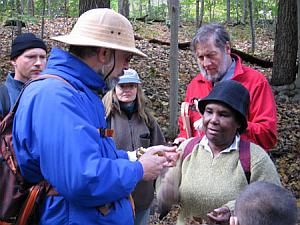
Organised mushroom picking enthusiasts identify a mushroom...
Mushroom picking does not impair future harvests – results of a long-term study in Switzerland. Forest fungi not only have important functions within the forest ecosystem, but picking their fruit bodies is also a popular past time, as well as a source of income in many developing and developed countries. The expansion of commercial harvesting in many parts of the world has led to widespread concern about over harvesting and possible damage to fungal resources. In 1975, we started a field research project to investigate the effects of mushroom picking on fruit body occurrence. The three treatments applied were the harvesting techniques picking and cutting, and the concomitant trampling of the forest floor. The results reveal that, contrary to expectations, long-term and systematic harvesting reduces neither the future yields of fruit bodies nor the species richness of wild forest fungi, irrespective of whether the harvesting technique was picking or cutting. Forest floor trampling does, however, reduce fruit body numbers, but our data show no evidence that trampling damaged the soil mycelia in the studied time period. Mushroom picking, Trampling, Fungi, Species richness, Conservation.
Many people come from abroad and pick the mushrooms. I wouldn't want a blanket ban but Switzerland has done that as has Epping Forest.
Mushroom pickers are being prosecuted after hundreds descended on Epping Forest to forage for "free" food.
Rangers are alarmed that the influx of pickers - encouraged by celebrity chefs like Hugh Fearnley-Whittingstall - will destroy the delicate ecosystem.
There has also been an increase in road accidents as deer, driven from secluded spots by the foragers, run in front of vehicles passing through the forest.
The 1,728-hectare Epping Forest has been declared a Site of Special Scientific Interest, partly because of the diversity of its fungi. Twelve keepers, who have powers of arrest, and other forest staff are mounting patrols and following tip-offs from the public, with six court cases pending. Pickers face fines of up to £200 for each offence. Part of it is down to the fact that it's been quite good weather for mushrooms.
Mr Baker said: "They pick poisonous mushrooms, edible mushrooms and mushrooms that they don't know what they are. We had somebody who collapsed and we had to call an ambulance. I can only assume she had been hunting mushrooms and had put her hand to her mouth. Many toadstools are being picked before they have produced spores - putting next year's crop at risk. This has happened in the New Forest, which has seen a decline in mushrooms this year."
There are many green and wild open spaces, even in London, so it's perfectly possible to forage for mushrooms – whether on Hampstead Heath, Epping Forest, Wimbledon Common or in the Walthamstow Marsh Nature Reserve. Go online at www.fungitobewith.org.
Wild mushroom varieties abound, but most commonly you will encounter chanterelles, porcini (or ceps), horn-of-plenty (trompette de la mort), fairy ring, chicken of the woods, hedgehog, puffballs, morels and if you're really lucky, the odd truffle.
Mushroom foraging safety tips - go out with an experienced guide.
Would you pay to go on a short course to learn how to forage for mushrooms?
Nice photos. I assume you didn't actually eat the fly agarics...
I have several books and when eating hedgehog mushrooms for the first time I used them all to confirm what it was. Alive still.
Since I got into picking fungi in Epping Forest I don't think I've bought a button mushroom. It only takes a couple of forays to become hooked on the thrill of wild mushroom hunting, and buying mushrooms from shops seems far too tame by comparison. In most other European countries, mushrooms, like berries and herbs, are an obvious source of wild food and the custom of picking them is part of the way of life. Here we've only recently come to realise that there is meaty vegetarian food in the forest for free. But competition is hotting up.
Bite back at the credit crunch and get your Wild Food for Free. Autumn's just around the corner, so mushrooms and berries will be at their best. Check out mushroom and wild food foraging courses around Britain and remember to book early - they're always popular. Or take it a step further and go all-out on outdoor survival courses. Food Safari offers both Wild Food Days foraging in the coast and countryside and Seafood Days catching and cooking while river fishing. Explore the countryside with Taste the Wild - foraging and cooking combined... If you thought foraging was just mushrooms, Wild Man Wild Food will give you food for thought... Forage for all kinds of edible treats, then find out how to cook them professionally as part of Fat Hen's Gourmet and Foraging weekends Forays and fungi walks around Greater London are available until late November with Fungi to Be With Join Chris Bax at Swinton Park for a ramble around the countryside foraging for wild food before a cook-up of the findings for lunch Forage your way through glorious countryside at The Wild Food School Wilderness Survival Skills take foraging to a new level with outdoor survival courses, including catching fish and game
The golden chanterelle is one of the most recognized edible mushrooms, famous for its delicious and exquisite taste.
Porcini (Boletus edulis) is a highly regarded edible mushroom. It has a number of English names, including cep (from its Catalan name cep or its French name cèpe), king bolete and penny bun. A common term in current use is porcini.
This is the biggest nonsense ever, really. British officials are very badly informed. Mushrooms that are harvested every year in the same spot, return every year. Yes, the crop varies, although not through over hunting, but the weather.
Picking of edible mushrooms is potentially endangering the ecosystem of places such as Epping Forest, north east of London or the New Forest, a vast site in southern of England.
Created in the Eleventh Century by William the Conqueror for deer hunting, the New Forest is the largest area of original woodland, heath land and unenclosed pasture remaining in England, covering nearly 600 square kilometres.
One problem is that fungi – the most commonly picked are chanterelles and ceps – are not now classified in the same group as flowers that are protected, so there is a loophole.
Personally I find the organised gangs of mushroom pickers somewhere between the surreal and the downright threatening
HEALTH: Mushroom pickers warned of dangers to health and risk of prosecution.
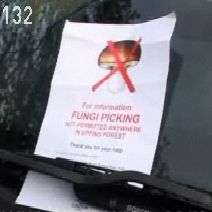
Mushroom pickers being warned of dangers to health and safety...
Warden carrying leaflet along. Warden Nick Baker (Senior Forest Keeper) putting 'Fungi Hunting Not Permitted Anywhere in Epping Forest' leaflet on car's windscreen.
London - At least six people face charges for harvesting wild mushrooms in historic Epping Forest north of London.
Hundreds more have been warned they could face fines if they persist, The Daily Telegraph reported.
Jelly Ears! Late Autumn Foraging & Delicious Mushroom Pasta!
"They pick poisonous mushrooms, edible mushrooms and mushrooms that they don't know what they are," Baker told the Telegraph. Epping Forest, which has been a royal forest since Henry III, has been woodland for thousands of years, although human exploitation has changed its character. Queen Victoria declared it the "People's Forest."
THE supermarket chain Waitrose has just launched a novel new form of seafood - but it has nothing to do with fish that swim in the sea. British-grown sea aster and samphire will be available at Waitrose this summer while the season lasts – so shoppers won't have to go foraging in the wild for them. Samphire and sea aster are classed as sea vegetables, not seaweed, and have a light delicate flavour. Britain's foraging trend grew to such an extent last year that illegal wild mushroom hunting at beauty spot Epping Forest hit a record high. Now it has moved to the coastline.
Covering some 6,000 acres, this is the largest public open space in the London area. Dating from ancient times (around 8,000 BC), the forest is thought to have been given legal status as a royal forest by Henry I in the 12th C. This allowed commoners to gather wood and foodstuffs, and to graze livestock - but only the King was allowed to hunt there.
Also join a mycological society. They often do fungi forays and you learn a lot from experts. My advice would be find someone who knows what they are looking for and learn from them.
But where there is free food there could be danger.
My neighbour has a massive mushroom in front of her house. I expect it is poisonous, no matter, I don't plan on even touching it.
The autumn season lasts until the first frost hits, which means the joys and the dangers of foraging will continue for several weeks yet.
Description of the Epping mushroom hunting area. Address: Near Coopersale village. County: Essex. Visitor centre: No. Shop: No shop. Picnic Area: No. Opening hours: Open at all times. Toilets: No toilets. Disabled toilet: No disabled toilet. Baby changing facilities: No baby changing facilities. Dogs: Yes. Horses: Yes. Admission fee: No.
Mushroom hunting: The feast, the fear and the fungi. The best way to start is to be shown what to pick by an expert. The National Trust, Forest Enterprise and many Wildlife Trusts run forays.
Tags: mushroom hunting, mushroom picking, edible mushrooms, mushroom pickers, wild mushroom hunting, epping forest mushrooms, epping mushroom hunting area, where to hunt mushrooms. All photographs that appear on this web page are copyright their respective owners and London Where claims no credit for them unless otherwise noted.